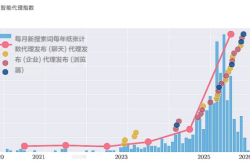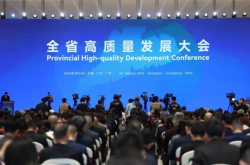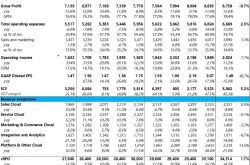The Future of Ride-Hailing Lies in AI
![]() 03/31 2025
03/31 2025
![]() 876
876
Source | Bohu Finance and Economics
In October 2023, nine months after its re-listing, Didi unveiled an ambitious growth plan: a 45% growth target for its China mobility business in 2023, followed by 10%-15% annual growth in 2024 and 2025.
In the increasingly competitive year of 2024, Didi achieved its goals as expected, with a total of 12.392 billion orders in China, an increase of 14.6% over 2023; GTV reached RMB 301.4 billion, an increase of 11.3% over 2023.
The continuous growth in order volume drove performance improvement. In 2024, Didi achieved revenue of RMB 206.8 billion, an increase of 7.5% year-on-year; net profit was RMB 1.3 billion, reversing the loss of RMB 4.8 billion in 2023.
However, this report card also hides a hint of anxiety. The international business is temporarily unable to support the company, and the overall profit mainly comes from asset divestitures. There has been no improvement in autonomous driving. In the efficiency-focused ride-hailing industry, Didi's technological foundation is still insufficient.
Investors are not satisfied with this either. In the U.S. pink sheet market where Didi has retreated, the stock price fell after the financial report was released. If Didi wants to successfully go public again in the future, it needs to make progress in autonomous driving.
After all, this is not only Didi's hope for breaking through growth boundaries but also the key to building a technological moat.
01 Trade-off between Price and Volume, Streamlining for Efficiency
In 2024, Didi's core platform transactions, including China mobility and international business, reached 16.005 billion orders, an increase of 18.8% over 2023; core platform GTV was RMB 392.7 billion, an increase of 16.2% over 2023.
On the surface, Didi's growth is still impressive, and its leading position remains solid. However, a closer look at the data reveals hidden concerns. As the core pillar of Didi's business, there is a "scissors gap" of 3.3% between the 14.6% growth rate in order volume and the 11.3% growth rate in GTV for its China mobility business.
This means that Didi is sacrificing higher unit prices for scale growth.
Further analyzing Didi's revenue growth quarter by quarter, order volume increased by 27.1%, 12.3%, 10.6%, and 10.8% from Q1 to Q4, respectively, while GTV increased by 21.1%, 8.7%, 7.8%, and 9.3%, respectively. Throughout the year, Didi's order volume grew faster than its transaction volume.
The continued decline in average order value further confirms the considerable pressure Didi faces in the domestic market. In the four quarters of 2024, Didi's average order value was RMB 24.2, RMB 24.5, RMB 24.5, and RMB 24.1, respectively, showing a downward trend, with Q4 hitting a new low of RMB 24.1.
Last year, there was a wave of ride-hailing companies going public, with platforms such as Dida and Ruqi Mobility successfully listing on the Hong Kong Stock Exchange, gaining more funds to enhance their competitiveness. Additionally, Gaode Maps, backed by Alibaba's ecosystem, uses a bidding mechanism to select lower prices through its aggregated platform, attracting more price-sensitive users.
The ride-hailing market is never calm. Although the cost-free price war of a decade ago is basically a thing of the past, the subsidy war between platforms has never stopped in the increasingly saturated market today.
Taking the journey from Guangzhou Library to Guangzhou Railway Station as an example, the lowest price offered by Gaode Maps for an economy ride is only RMB 13, while Didi's one-price special carpooling scheme starts at RMB 15.7.
(Image: Platform Screenshot)
To withstand competition, Didi's sales and marketing expenses increased to RMB 11.5 billion last year, an increase of 10.4% year-on-year, mainly due to increased consumer incentives, but the overall proportion of revenue decreased.
The strategy of "burning money for incremental growth" seems to work but actually exposes Didi's passivity in stock competition. When subsidies become the norm, the relationship between the platform and users will further degrade from "value binding" to "price dependence".
In the ride-hailing operating system, one end of the scale is the user, and the other end is the driver. If the scale is not balanced, and the user experience and driver income growth fail to achieve a good balance, then competition, compliance, and other pressures will naturally follow, ultimately leading to user loss.
From 2020 to 2024, the number of ride-hailing drivers in China surged from less than 3 million to nearly 7.5 million. Overcapacity warnings have been issued in various places, including Jingdezhen, Suzhou, Chongqing, and Putian. With a limited pie, the platform's management capabilities are put to the test.
Didi's adjusted EBITA (earnings before interest, taxes, depreciation, and amortization) in 2024 was RMB 4.33 billion, compared to an adjusted EBITA loss of RMB 2.163 billion in the same period last year, achieving a turnaround at the annual level.
Subsidies continue, and making money relies more on shedding the money-losing smart vehicle business. In August 2023, Didi sold its smart vehicle business to XPeng Motors, shedding a burden of annual losses exceeding RMB 2 billion. This measure had an immediate effect, with net profit in 2024 increasing by 58% year-on-year.
Of course, this not only improved Didi's profit structure but also allowed Didi to concentrate on addressing market competition.
02 The Overseas Landscape is Nice, but Not Enough to "Lie Down"
"If you hit a bottleneck with 800 million users, go international. Just like breaking through the first cosmic velocity, from Earth to the solar system, where there are 6 billion users." In an interview in 2018, Didi founder Cheng Wei said so.
Didi established an overseas business team in 2017 and is now in its eighth year of going abroad. The foreign market has indeed given Didi a breather.
The financial report shows that in 2024, Didi's total international business orders reached 3.613 billion, an increase of 35.8% over 2023, with the quarterly average daily orders exceeding 11 million; total transaction value was RMB 91.3 billion, an increase of 34.8% over 2023, and GTV maintained a growth rate of over 30% for four consecutive quarters.
The high growth of the international business is like a shot in the arm, but it is far from the time to "lie down".
Currently, Didi's overseas ride-hailing business covers 14 countries and regions worldwide, including Brazil, Japan, Australia, and New Zealand. However, the development between regions is very uneven. About 90% of overseas orders come from Brazil and Mexico, rather than markets with stronger consumer power such as Japan, Australia, and New Zealand.
Similar to the domestic market, Didi has also used low prices as a weapon in its overseas expansion. The international ride-hailing giant Uber mainly occupies the mid-to-high-end chauffeur service market, while Didi focuses on low-cost express and two-wheeled vehicle services.
According to a report by LatePost, Didi prioritizes developing express services in third- and fourth-tier cities in countries like Brazil, relying on lower prices and more abundant transport options to compete with Uber.
In Brazil, Didi launched a two-wheeled motorcycle business earlier than Uber and charges lower commissions from drivers, attracting more drivers and quickly achieving economies of scale. To this day, among Didi's daily orders of tens of millions in Brazil and Mexico, motorcycle orders still rank among the top.
By adhering to the cost-effective route for many years, Didi's overseas business has maintained good growth momentum, and its ability to generate revenue has gradually emerged. In 2024, Didi's international mobility business achieved adjusted EBITA profitability, making a significant contribution to the company's turnaround.
Referring to Uber, Didi needs to explore more markets in the future.
Didi's internationalization journey has been full of twists and turns. In August 2020, Didi officially entered the Russian market, hoping to gradually expand its ride-hailing business from Russia to European countries. However, due to strong resistance from local competitors Yandex and Citymobil, even burning money did not work, and Didi withdrew in February 2022, failing to enter the European market to this day.
Didi continues to increase investment in its international business but has changed its approach.
On January 20, 2025, the Didi Chuxing App launched a trial "Overseas Travel" feature targeting Chinese outbound tourists, with initial trial services covering 80 popular tourist destinations such as South Korea, Singapore, Malaysia, Indonesia, and Vietnam.
This strategy seems clever but ties incremental growth to the external variable of tourism recovery, which is highly uncertain. If Didi still cannot break through in high-value markets such as Europe and the United States, its international business may not grow into a true second growth curve.
03 Autonomous Driving Still Determines the Growth Boundary
"Entering 2025, while continuing to deepen our main business, we will adhere to 'responsible innovation', promote the development of autonomous driving and AI applications, and bring better services to passengers, drivers, and ecological partners." Didi founder and CEO Cheng Wei said. It is not difficult to see that autonomous driving is a key focus of Didi's future development.
Didi is one of the earliest ride-hailing platforms to layout autonomous driving. Despite having the richest user travel data, it failed to timely convert this into technological advantages due to resource allocation issues, resulting in its descent from an early adopter to a follower.
As early as 2016, Didi began researching and testing autonomous driving technology, initially focusing more on vehicle manufacturing. After unsmooth cooperation with automakers, it launched the "Da Vinci" project. However, whether it was cooperating with automakers to build an automotive operator platform or "going it alone" by establishing the "Da Vinci" vehicle manufacturing project, related businesses progressed unsmoothly. Ultimately, under financial pressure, Didi packaged and sold its smart vehicle business to XPeng, focusing on autonomous driving.
Currently, the autonomous driving sector is in a fierce competition, and Didi may only be on the edge of the table. Ruqi Mobility told a story of Robotaxi and successfully obtained the key to open the door to the Hong Kong Stock Exchange. Backed by GAC Group, it plans to deploy 5,000 Robotaxis by 2025.
Baidu's Luobo Kuaipao has become a "price killer", reducing the cost per kilometer to as low as RMB 1.2, causing drivers to exclaim that they "can't compete". With an average daily order volume exceeding 15,000 in Beijing, Shanghai, and other places, it is expected to enter a full profit period by 2025. In addition to Wuhan, Luobo Kuaipao has covered more than 10 cities in China and has even "run" to Abu Dhabi in the United Arab Emirates.
In contrast, according to the latest official data from Didi Autonomous Driving, it has over 200 autonomous vehicles in cities such as Beijing, Shanghai, and Guangzhou, and has achieved mixed order dispatch in the operating areas of Shanghai and Guangzhou, but its presence is far less than that of Luobo Kuaipao.
As a counterattack, Didi has partnered with GAC Aion to launch a project for mass production of unmanned new energy vehicles, jointly establishing Guangzhou Andi Technology Company for vehicle manufacturing. The first L4-level unmanned vehicle is expected to go into mass production in 2025.
At the same time, it is seeking external funding to replenish ammunition. According to public reports, in October 2024, Didi Autonomous Driving announced the completion of its Series C funding, totaling USD 298 million. It is currently seeking a new round of funding of USD 5 billion to accelerate the mass production of its first Robotaxi.
Didi announced that "Zhang Bo, the co-founder who has served as Didi's CTO for 12 years, has stepped down from his position as CTO. He will continue to serve as a member of the Didi Group's class committee and concurrently serve as the CEO of the autonomous driving company. In the future, Zhang Bo's focus will be on the autonomous driving business."
At the end of last year, Didi co-founder Zhang Bo stepped down as CTO and continued to serve as the CEO of Didi's autonomous driving company, focusing on Didi's autonomous driving business.
The presence of senior executives and funds indicates that Didi is increasing its bet on autonomous driving and accelerating its efforts to secure a ticket to the Robotaxi market.
In the traditional ride-hailing market, performance relies heavily on subsidies and the driver ecosystem. Didi has established its market-leading position through large-scale spending, but it still needs occasional subsidies to stabilize its share.
Efficiency improvements brought about by infrastructure such as data and technology are Didi's moat. In the AI era, autonomous driving is undoubtedly a key brick in the moat, reshaping the cost structure.
Furthermore, for ride-hailing platforms, the introduction of Robotaxi also means less risk. In particular, safety issues that have long been criticized and of concern for products such as ride-sharing have plagued many platforms, including Didi. With the introduction of Robotaxi, these issues may disappear.
There are increasing signs that the accelerated popularization of Robotaxi is already a general trend. Whoever can take the lead in finding a breakthrough point may fundamentally change the competitive landscape.
The cover image and accompanying images of the article belong to the copyright owner. If the copyright owner believes that their work is not suitable for public browsing or should not be used free of charge, please contact us promptly, and this platform will immediately make corrections.








